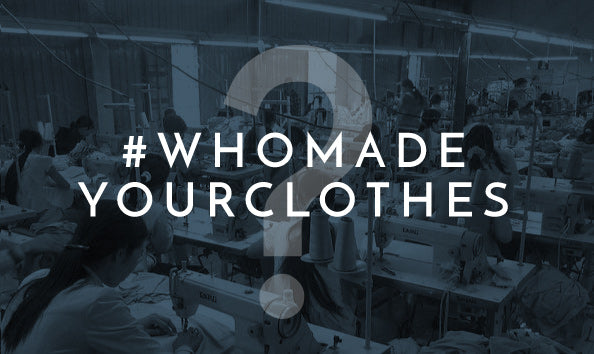#Who Made Your Clothes

Do you know who made your clothes? Much of the global fashion industry desperately needs change. We're suggesting becoming more aware of how your spending habits affect people and our planet.
In this day and age with our delicate global climate, there are 3 questions we should all be asking about the clothing we buy. We are not afraid to answer these questions and hope it will make you feel good about the purchases you make with us.
1. Who Made Your Clothes?
Diane Kennedy clothing employs Canadians at every step of the manufacturing process. Designs and patterns are all developed at our Diane Kennedy Studio and manufactured close by in Vancouver B.C. We regularly visit our factories and have a personal, face to face relationship with them. Diane can attest to the fact that the garment workers have safe work conditions to high Canadian standards and are paid fair wages.
*Worldwide 1 in 6 people works in the apparel industry. Over 80% of these people are women; 98% do not receive a living wage.
2. Where Are Your Clothes Made?
Canadian Made and proud of it! The factories we use for production are all local to us, some just steps from our door in Vancouver B.C. Canada.
We're also able to produce in small batches, which means producing to demand, and a more sustainable business model. Our carbon footprint is lower because everything is made in Canada and shipped within North America. No containers on ships crossing the Pacific needed.
*In 1989 70% of clothing worn in Canada was made in Canada, today it's less than 5%. Trade barriers introduced in 2003 have moved much of the manufacturing of apparel overseas.
3. What Are Your Clothes Made Of?
Diane Kennedy's super soft knit is made from Certified Organic bamboo fibers. Without assistance from man, bamboo is grown 100% naturally. A highly sustainable crop, bamboo does not require the use of pesticides and herbicides for crop production. Plantations can easily be kept organic as a result. Did you know bamboo produces 35% more oxygen than trees per the same amount of space? Additionally, as the plant is flood and drought resistant, water irrigation is not necessary for production. Bamboo is easily biodegradable and decomposes very rapidly back into the soil.
*The percentage of Polyester clothing being manufactured overseas has far surpassed clothing made with any natural fibers since 2009. Made from fossil fuels, polyester is extremely energy intensive to produce. It creates microplastics in our oceans and does not degrade or break down. Likewise, every piece of polyester clothing ever made is still around.
When you make a choice to purchase from us it means so much more. You are supporting a company that cares about people. You are choosing to consider the people who made your clothes. Furthermore, you are choosing a quality garment that is easy on the environment and will last for many years.
Thanks for being our customer!






